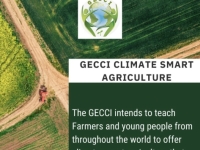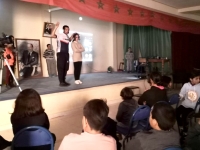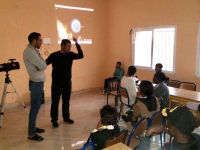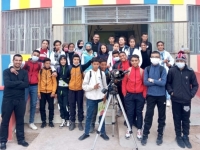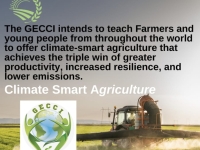Technology
The GECCI Energy Compact Team attended the UN Energy Compact Action Network
Train manpower for projects
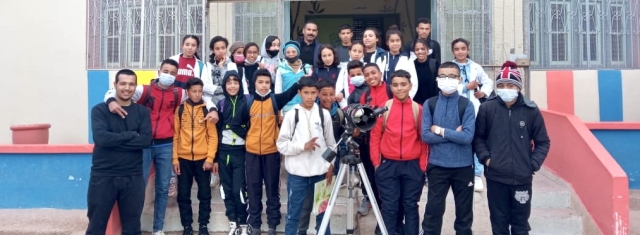
GECCI (Source: Ak )
USPA NEWS -
The GECCI Energy Compact Team attended the UN Energy Compact Action Network.
The Virtual Meeting Organized under the UN-Energy Secretariat. Similarly, the goal of the GECCI Energy Compact is to promote sustainability, environmental friendliness, millions of green job opportunities, empowerment, and climate smart agriculture.
At the Meeting Prof. Robinson I. Ejilah, Director of GECCI Energy Compact, pointed out that many unelectrified rural communities across sub-Saharan Africa remain dominated by use of traditional fuels and livelihoods dependent on metabolic energy. Efforts to increase access to modern energy services in these communities is predicated on the assumption that it will lead to improved well-being and economic development. There is rarely any consideration of how local culture might mediate the distribution of electrification benefits across different genders and social sub-groups.
The Virtual Meeting Organized under the UN-Energy Secretariat. Similarly, the goal of the GECCI Energy Compact is to promote sustainability, environmental friendliness, millions of green job opportunities, empowerment, and climate smart agriculture.
At the Meeting Prof. Robinson I. Ejilah, Director of GECCI Energy Compact, pointed out that many unelectrified rural communities across sub-Saharan Africa remain dominated by use of traditional fuels and livelihoods dependent on metabolic energy. Efforts to increase access to modern energy services in these communities is predicated on the assumption that it will lead to improved well-being and economic development. There is rarely any consideration of how local culture might mediate the distribution of electrification benefits across different genders and social sub-groups.
How do we improve the influence of culture on gender to achieve energy transition for the economic development of rural communities while improving on the well being of the female gender.
Also, Prof. Abdullahi Ahmed, the Project Secretary, made his remarks on ways to implement the long-time building resilience and capacity-building workshop on energy transition.
Dr. Ahmad Khaleel, GECCI Project Director, Dr. Abdulhamid Tahir Hamid, CEO of GECCI, Mr. Samuel Adakole Onah (Assistant Project Manager), Mr. Gabriel Abraham Bala, Engr. Dr. Felicia Agubata, Ojelola Kayode, Amb. Sadiya Ibrahim Karamba (Business Analyst), and others attended the meeting.
Also, Prof. Abdullahi Ahmed, the Project Secretary, made his remarks on ways to implement the long-time building resilience and capacity-building workshop on energy transition.
Dr. Ahmad Khaleel, GECCI Project Director, Dr. Abdulhamid Tahir Hamid, CEO of GECCI, Mr. Samuel Adakole Onah (Assistant Project Manager), Mr. Gabriel Abraham Bala, Engr. Dr. Felicia Agubata, Ojelola Kayode, Amb. Sadiya Ibrahim Karamba (Business Analyst), and others attended the meeting.
Joined by the other Project Implementation Board members, Mr. Obasi John, Engr. Oduwa Agboneni, Abubakar Muhammad Abatcha, Ojelola Kayode, Mr. Nathaniel Yusuf, Jamilu Jibril.
The SDG7 Energy Compact of the Global Environmental and Climate Conservation Initiative (GECCI) is a Next Decade Action Agenda to advance SDG7 on Sustainable Energy for All, in line with the Paris Agreement on Climate Change goals. We are focusing on the achievement of SDG7, to accelerate action for clean, affordable energy for all.
Access Ambition: Local Solar Crafts
- To promote local solar crafts. Small and medium-sized enterprises are important factors in the fight against poverty and job creation. That’s why we plan to use donor-funded projects to support 5 million communities with local solar crafts. It is expected that 5 million rural and under-served citizens will benefit from the Solar Power Strategy by 2030.
The SDG7 Energy Compact of the Global Environmental and Climate Conservation Initiative (GECCI) is a Next Decade Action Agenda to advance SDG7 on Sustainable Energy for All, in line with the Paris Agreement on Climate Change goals. We are focusing on the achievement of SDG7, to accelerate action for clean, affordable energy for all.
Access Ambition: Local Solar Crafts
- To promote local solar crafts. Small and medium-sized enterprises are important factors in the fight against poverty and job creation. That’s why we plan to use donor-funded projects to support 5 million communities with local solar crafts. It is expected that 5 million rural and under-served citizens will benefit from the Solar Power Strategy by 2030.
- 2 million homes will be converted from the use of polluting fuels (kerosene, charcoal, and diesel) to LPG and biogas for cooking.
- 10,000 post primary schools will be provided with solar lights by 2030.
- 10,000 solar villages will be created by 2030.
- 5,000 solar water pumps will be provided for 5000 villages by 2030.
- 10,000 solar-powered refrigerators will be provided for 500 villages by 2030.
- 2 million homes will transit from the use of diesel and gasoline- powered generators to pollution-free solar mini-grids for power supply.
- Youth-led energy projects are linked to financing opportunities.
Connecting youth-led energy projects (start-ups, NGOs, etc.) with funding opportunities
- Obtaining pledges from youth-led organizations, enterprises, and other organizations
- Provide available funding opportunities to provide seed funding for the best projects to scale.
- Assign the awardees to a team of experienced mentors and accountabilities partner to hone their entrepreneurial skills.
- 10,000 post primary schools will be provided with solar lights by 2030.
- 10,000 solar villages will be created by 2030.
- 5,000 solar water pumps will be provided for 5000 villages by 2030.
- 10,000 solar-powered refrigerators will be provided for 500 villages by 2030.
- 2 million homes will transit from the use of diesel and gasoline- powered generators to pollution-free solar mini-grids for power supply.
- Youth-led energy projects are linked to financing opportunities.
Connecting youth-led energy projects (start-ups, NGOs, etc.) with funding opportunities
- Obtaining pledges from youth-led organizations, enterprises, and other organizations
- Provide available funding opportunities to provide seed funding for the best projects to scale.
- Assign the awardees to a team of experienced mentors and accountabilities partner to hone their entrepreneurial skills.
Its activities and presence spanned over 90 countries around the world with over 22,000, mostly youths from 18-45 years old, teams campaigning for sustainable agriculture, biodiversity protection, clean energy and encouraging socially responsible farming.
Our operations span a geo-scheme of six regions: Africa, Europe, West Asia, Asia Pacific, Latin America & the Caribbean, and North America.
Said :
Abdulhamid Tahir Hamid
CEO, GECCI
more information: https://Aurangzeb
Liability for this article lies with the author, who also holds the copyright. Editorial content from USPA may be quoted on other websites as long as the quote comprises no more than 5% of the entire text, is marked as such and the source is named (via hyperlink).

